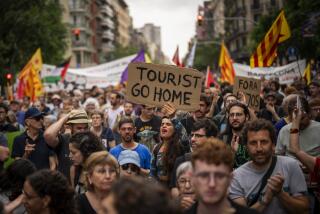Tibet Slams Doors on Tourists While It Deals With Civil Unrest
- Share via
BEIJING — Budget-minded travelers trudge through snow to leave, tour groups are canceling their visits and hotels are almost empty.
Tourism, hailed only recently as Tibet’s new lifeblood, is drying up.
Since Tibetan anger against Chinese rule exploded into bloody rioting last fall, the authorities have shut Tibet’s doors on all foreigners except for a few tour groups.
“We know of no more tours coming in. Our occupancy rate is down to 10%,” said an employee at the luxury Lhasa Hotel.
Hotels Nearly Empty
Set among ancient temples and busy markets, budget hotels for Western backpackers are nearly empty. Small, private restaurants have almost no one to eat their yakburgers.
Despite spellbinding clear skies and snowy mountains, winter is normally a quiet period. But this year, managers say, these next few months will be dead unless the borders open again.
Just two months ago, officials were promoting tourism as a life force for Tibet, where peasants are among the poorest in China with an annual income of only $100.
People’s Daily, the Communist Party newspaper, said in September that Tibet’s new policy called for “building an economy centered on tourism and based on agriculture and husbandry.”
Investment in Agriculture
Using profits from tourism, Tibet invested $24 million in agriculture last year.
About 30,000 tourists visited Tibet in 1986 and officials said they wanted to attract an annual 200,000 to the “Roof of the World” by the year 2000.
“Tibet lures more tourists,” was the headline of a report by the official New China News Agency last March.
“Tourism has not only brought about good economic results but also social results,” People’s Daily quoted a Lhasa official as saying. With the benefit of hindsight, the comments carry unconscious irony.
After the Oct. 1 rioting, which left up to 19 people dead, the authorities sought to place some of the blame on foreigners.
Police Officers Stoned
Indeed, a few young, Western travelers joined hundreds of Tibetans throwing stones against police, and a bullet pierced one American’s hat when police opened fire.
Many foreigners, including journalists, took dramatic photographs which were published around the world and Western doctors treated Tibetans with bullet wounds in secret.
Apart from American dollars much desired by the authorities, tourists have brought in precious pictures of Tibet’s spiritual leader, the Dalai Lama, and news of his government in exile in India.
Police expelled two Americans from China several weeks ago for carrying nationalist Tibetan symbols on their bags.
Western Influences Abound
Signs of growing Western influence abound in Lhasa. In the shadow of the Potala Palace, restaurants advertise their dishes in broken English.
Hotel sources said the Lhasa Hotel, managed by the Holiday Inn Group and offering comforts that help attract Westerners, will just about make a profit this year but some tours have canceled.
Hundreds of Tibetans who have put their savings into small tourist ventures will suffer the most.
“Once you have let foreign tourists in and changed your economy accordingly, then it’s a disaster when you turn off the tap,” one hotel manager commented.
Western diplomats in Beijing, some of whom were also denied permission to visit Tibet, said they believed the authorities would have to reopen the doors soon or face more discontent.
Early next year, the Tibetans will celebrate their own New Year’s festival, building giant statues out of wood and coating them with yak butter. The festivities normally draw thousands of Tibetans into Lhasa as well as hundreds of wealthy tourists.
More to Read
Sign up for Essential California
The most important California stories and recommendations in your inbox every morning.
You may occasionally receive promotional content from the Los Angeles Times.










